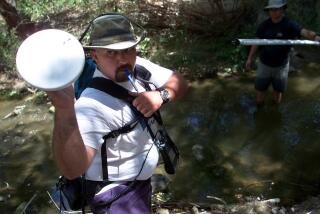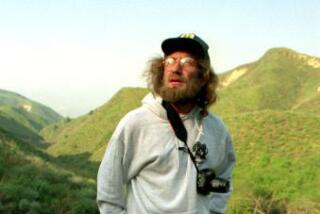Ecologists Honored for Their Work : Environment: The man who sparked the tuna industry reform by filming dolphin killings is among those receiving a $60,000 Goldman Prize.
- Share via
Sam LaBudde of San Francisco, whose daring, secret videotaping of dolphin killings by tuna fishermen sparked industry reform, is the U.S. recipient of a $60,000 Goldman Environmental Prize for grass-roots heroism. Six international prizes of $60,000 will be awarded today at a ceremony in San Francisco.
“For this 21st anniversary of Earth Day, we are delighted to be honoring heroes from every corner of this planet who are helping to ensure a safe environment for generations to come,” said Richard Goldman, the San Francisco philanthropist whose foundation created the prizes to encourage environmental activism.
The winners, nominated by environmental organizations, “have worked diligently and often at extreme personal sacrifice to make Planet Earth a better place in which to live,” he said.
LaBudde, 34, a former fisheries biologist, signed on as deckhand and cook aboard a Panamanian-registered fishing boat in 1987. For months, he secretly videotaped the slaughter of dolphins caught in drift nets during tuna harvests off the Mexico coast. Widespread TV airing of his graphic footage, and resulting consumer outcries, led to last April’s decision by major U.S. tuna firms to stop buying tuna caught by drift nets.
“If Sam hadn’t gone out, it might have taken another decade to stop the killing,” said David Phillips, director of the Earth Island Institute’s dolphin project.
Nominations for a Goldman Prize, the world’s largest environmental prize program, are made by 18 major environmental organizations. Winners are chosen by an international panel. Richard and Rhoda Goldman, longtime environmentalists and supporters of organizations like the Nature Conservancy, Natural Resources Defense Council and the Sierra Club, established the prize in 1989.
Other 1991 winners:
Wangari Muta Maathai, 51, of Kenya. A University of Nairobi professor, Maathai planted a small tree nursery in her yard in 1977. That launched a model Green Belt movement employing thousands of women who have now planted more than 10 million trees to counter the ravages of deforestation in Kenya.
Yoichi Kuroda, 37, of Tokyo, a researcher and coordinator of the Japan Tropical Forest Network. The activist coalition’s widely distributed data exposing Japan’s destructive consumption of rain forests in Thailand and the Philippines has led to corporate steps toward logging reform and reducing the country’s massive tropical timber imports.
Joint winners Roland Tiensuu, 12, of Sorunda, Sweden, and his former teacher, Eha Kern, 44. After hearing a 1987 lecture on rain forest destruction, they held a bake sale to purchase nine acres of rain forest reserve and launched the Barnens Regnskog, a student nonprofit organization; 4,000 schools now have raised $1.5 million and purchased 2,800 acres of rain forest.
Catherine Wallace, 39, of Wellington, New Zealand, a writer and lecturer on resource economics at Victoria University in Wellington. Her work with the Antarctic and Southern Ocean Coalition is credited with protecting Antarctic mineral supplies by monitoring mining bans and other treaties.
Evaristo Nugkuag, 41, of Peru’s Aguaruna tribe. His concern with the mining and logging destruction of Amazon Indian forests led to the founding of the Coordinating Body of the Federations of Amazonian Indians. The group is building land-reform alliances between its 1.2 million members in five Amazon countries and international environmentalists.
The visiting winners will spend a week in the United States, giving news conferences and interviews in New York and Washington.
“It’s our hope,” said Rhoda Goldman, “that the prizes will inspire others around the world to act on behalf of the environment as well as encourage governments to review their existing environmental policies.”
More to Read
Sign up for Essential California
The most important California stories and recommendations in your inbox every morning.
You may occasionally receive promotional content from the Los Angeles Times.













